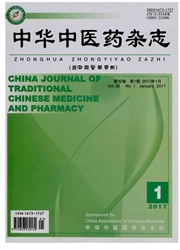

 中文摘要:
中文摘要:
多发性硬化是好发于青壮年的中枢神经系统自身免疫性脱髓鞘疾病,其临床症状多变,常表现为视力下降、肢体瘫痪、感觉障碍、二便障碍等,高级神经功能也常受累。中医理论认为本病主要属“痿证”范畴。疾病急性复发时以肝肾阴虚兼夹痰瘀内热为主,而大剂量激素的应用则更是助火伤阴,使肝肾之阴益亏。随着疾病的不断反复和缓慢进展,阴损及阳,终致阴阳两亏。因此,除以补益肝肾,化痰活血为治疗大法外,还应注意个体化治疗,在辨证的基础上,根据疾病损伤的不同侧重点,相应配以清热、温阳、行气、通腑、养血、疏肝之品以收全功。
 英文摘要:
英文摘要:
Disseminated sclerosis (DS) is an autoimmune demyelinating disease of the central nervous system (CNS) that attacks generally the youth. The common symptoms of DS are hypopsia, paralysis, abnormal sense, urine deposited, dysfunction of bowels, etc. Sometimes MS also injures neural advanced functions. Traditional Chinese Medicine (TCM) mainly defines DS as "atrophy syndrome" according to its clinic symptoms. During acute relapsing period, most DS patients present deficiency of yin of both the kidney and liver, occurring with blood stasis and phlegm. Moreover, high dose methylprednisolone can activate pathogenic fire to damage the yin that aggravates deficiency of yin. Along with repeated relapse and evolvement of DS, the body's condition will change into syndrome of deficiency of both the yin and yang. So, the drugs of nourishing both the kidney and liver yin, activating blood circulation and clearing phlegm should be applied first to treat DS. Besides, the drugs of clearing heat, activating yang, motivating flow of qi, dredging the Fu-organ, invigorating blood and regulating liver-qi should also be used according to the different syndromes.
 同期刊论文项目
同期刊论文项目
 同项目期刊论文
同项目期刊论文
 期刊信息
期刊信息
